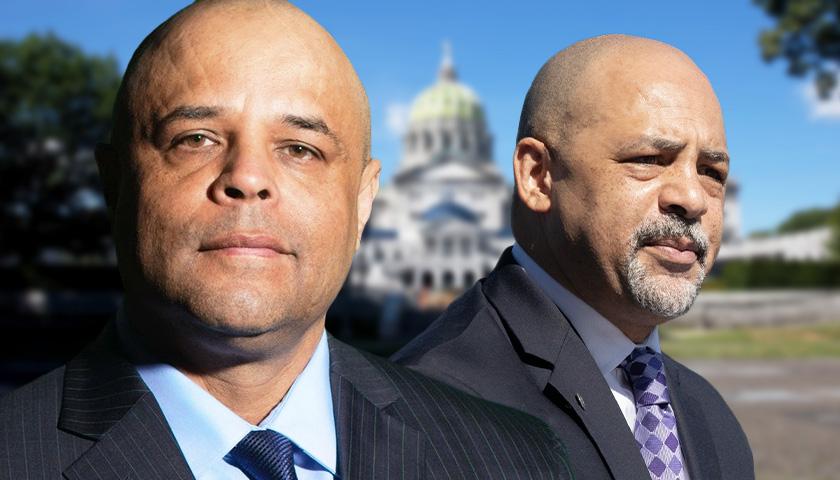Pennsylvania House Democrats this week proposed a measure called the “Police and Community Safety Act,” the sole purpose of which is barring police and campus security agencies from enforcing immigration laws.
Spearheaded by State Representatives Jose Giral (D-Philadelphia) (pictured above, left) and Chris Rabb (D-Philadelphia) (pictured above, right), the bill resembles legislation the latter introduced unsuccessfully in 2017.
Sponsors insist their policy makes sense because law enforcement organizations incur significant costs when they detain illegal immigrants. In a memorandum asking colleagues to back the bill, Giral cited figures from the leftist North Carolina Budget & Tax Center showing North Carolina and Georgia respectively spent $7.4 million and $9 million holding illegal arrestees in 2017.
The representative also stated that the real risk of detention and deportation jeopardizes public safety by making illegal alien witnesses and victims less willing to cooperate in criminal investigations.
“When local governments lose the power to tackle crime in a way that best serves their communities, their law enforcement officers are prevented from upholding their oath to protect and serve the families and neighborhoods that rely on them…,” Giral wrote. “By more effectively and efficiently directing the state’s limited resources to the protection of the public, we can improve trust between police officers and the communities they serve.”
His legislation would prohibit law enforcement departments from using their resources to “detain, detect or arrest persons for immigration enforcement purposes….” The bill lists some of those purposes but does not limit its scope to them. They include “inquiring into… an individual’s immigration status…, detaining an individual on the basis of a hold request…, making arrests based on civil immigration warrants [and] giving Federal immigration authorities access to individuals in agency or department custody for immigration enforcement purposes.”
The measure also forbids state or local agencies from “performing the functions of an immigration officer” or “mak[ing] agency or department databases… available to any person for the purpose of immigration enforcement.”
Andrew Arthur, a former York, Pennsylvania Immigration Court judge now a fellow at the D.C.-based Center for Immigration Studies (CIS), said the legislation would likely beget results contrasting with the sponsors’ fiscal and public-safety goals.
First, he explained, while available data don’t clarify how likely most illegal immigrants are to commit crimes, they show that illegals who do commit crimes overwhelmingly re-offend. In March 2011, the U.S. Government Accountability Office determined that federally imprisoned criminal aliens averaged seven arrests each, with 65 percent having at least one immigration-related arrest and about half having at least one drug-related apprehension.
“We do know that amongst aliens unlawfully present in the United States who are criminals, the rates of recidivism are very high,” Arthur told The Pennsylvania Daily Star in a Tuesday interview. “So you’re going to end up having to have additional law-enforcement arrest them again, prosecute them again, detain them again and incarcerate them again.”
To Arthur, that reality suggests “sanctuary” jurisdictions that disallow agencies to hold offenders for pickup by U.S. Immigration and Customs Enforcement (ICE) end up spending more money and making area residents less secure. He furthermore disputed that the Giral measure would likely protect alien communities, observing that criminal aliens most frequently victimize other immigrants.
“People go and commit crimes in the neighborhoods from which they come and if they come from an immigrant neighborhood, which many do — I don’t want to [speak] too broadly… —but what we see over and over again is that the victims of those crimes are themselves other immigrants,” he said. “So you don’t really make immigrant communities any safer when you shield alien criminals from removal. Once they’re removed, they’re gone; they can’t prey on the community anymore.”
Arthur said he believes the proposed bill is particularly ill-advised insofar as it would obstruct federal authorities from questioning criminal aliens in secure environments where suspects are confirmed to be unarmed.
“It’s almost petty and punitive to say you can’t let an ICE officer into a police station to talk to somebody…,” he said. “You’re already detaining them…. By barring ICE from doing that, you’re truly just exposing not just the ICE officer but the community at large to unacceptable risks.”
According to CIS, sixteen Pennsylvania localities currently have sanctuary policies preventing law-enforcement agencies from fully cooperating with ICE. Those include Philadelphia as well as the counties of Allegheny, Bradford, Bucks, Chester, Clarion, Dauphin, Delaware, Franklin, Lehigh, Lycoming, Montgomery, Montour, Northampton, Pike and Westmoreland. If Pennsylvania enacted Giral’s bill, it would join California, Colorado, Connecticut, Illinois, Massachusetts, New Jersey, New Mexico, New York, Oregon, Vermont and Washington in becoming a uniformly sanctuary state.
– – –
Bradley Vasoli is managing editor of The Pennsylvania Daily Star. Follow Brad on Twitter at @BVasoli. Email tips to [email protected].
Photo “Jose Giral” by Jose Giral. Photo “Chris Rabb” by Governor Tom Wolf. CC BY 2.0. Background Photo “Pennsylvania State Capitol” by Governor Tom Wolf. CC BY 2.0.





